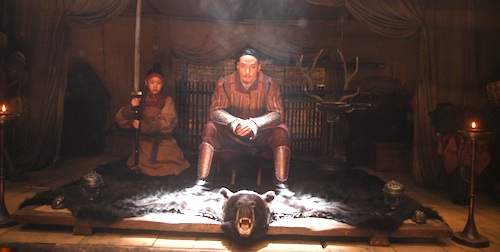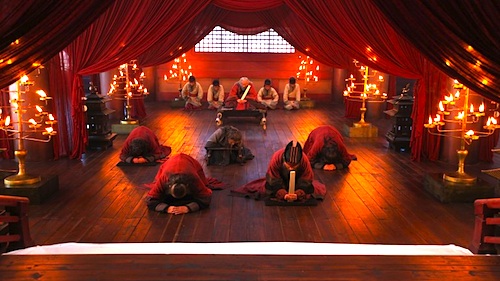
By Joe Bendel. The Biblical echoes are slightly misleading, but not wholly inappropriate. For those present, the notorious Hongmen Banquet is the betrayal that keeps on betraying. The murky events in question will continue to haunt the first Han Emperor until his final tormented moments in Lu Chuan’s The Last Supper (trailer here), which screens Wednesday during the 2013 New York Asian Film Festival.
Everyone realizes Emperor Gaozu, a.k.a. Liu Bang, is not long for this earth, including the common-born emperor from Pei County. However, he is not going out gracefully. Haunted by nightmares and visions of his past, Liu Bang sees conspiracies in every shadow. He ought to know. He reached the throne through some shrewdly timed treachery. Once sworn allies with Lord Yu and General Xin, he has killed the former and imprisoned the latter to solidify his hold on the throne.
Liu Bang has not exactly been scrupulously faithful to his wife, the Empress Lü Zhi, either. Regardless, she will act ruthlessly to protect his legacy. The empress decides it is time to be well rid of Xin once and for all, but his prominence and his highly placed friends in court provide him a slim measure of protection.
Frankly, we are quite fortunate to have Last Supper screening at NYAFF, considering its release was held up for four months by government censors. It is not hard to see what troubled the obedient apparatchiks. Even a bureaucrat could pick up on the film’s “absolute power corrupts absolutely” implications. This is the high tragedy of a man who gains an empire but loses his humanity (a point that also emerges, albeit somewhat less forcefully, in Daniel Lee’s White Vengeance, which also dramatizes the circumstances surrounding the Hongmen Banquet.)

For Lu, this represents a dramatic change of pace from his stark portrayal of Japanese war crimes in City of Life and Death. Obviously less politically correct for the powers that be, Supper is further differentiated by a feverish atmosphere that often approaches the outright demonic. Yet, it is also a grand period production, with enough imposing sets and palace guard extras to satisfy Cecil B. DeMille.
Supper is also notable for the geographically diverse casting of the main triumvirate that surely ought to pay dividends at the respective box offices. Mainlander Liu Ye nicely portrays the raging paranoia of Liu Bang’s twilight years without descending to shtick or gimmicks. Hong Kong super-star Daniel Wu captures the nobility of the tragic Lord Yu, while Taiwanese Chang Chen is impressively steely as General Xin. Nonetheless, Qin Lan (Lu’s wife and frequent collaborator) dominates the film with her spellbinding Lady Macbeth-like portrayal of Lü Zhi.
The strangely timely Supper comes as a welcome rebuttal to Chinese films like Hero or The Guillotines that celebrate or at least excuse strong centralized authority. Lu’s vision of Liu Bang clearly suggests the emperor’s madness and absolute power are two sides of the same coin. In addition to its challenging subtext, The Last Supper also happens to be an excellent film, well worth seeing for its striking look and Qin Lan’s commanding performance. Highly recommended, it screens Wednesday afternoon (7/10) at the Walter Reade as part of this year’s New York Asian Film Festival.
LFM GRADE: A-
Posted on July 8th, 2013 at 1:08pm.